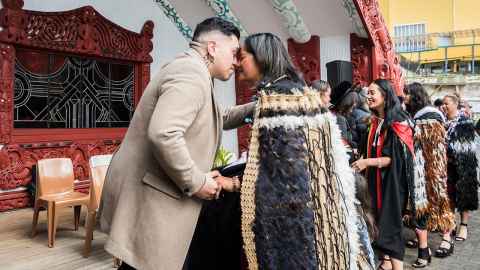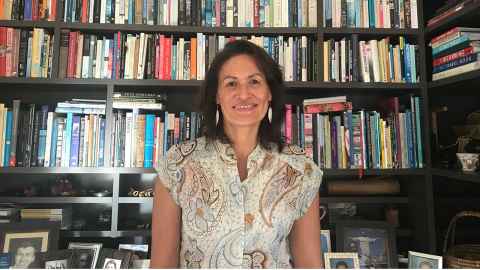Study to assess the impact of Covid-19 on tikanga
5 May 2020
Dr Marama Muru-Lanning, director of the James Henare Māori Research Centre, and University of Auckland colleagues, have a Health Research Council grant to assess the impact of Covid-19 on kaumātua and tikanga.

Will people still want to hongi? What I’ve learned talking to kaumātua is tikanga is a fluid thing and has to change to fit the times.
At a hui held in Kāwhia several weeks before lockdown, Dr Marama Muru-Lanning, director of the James Henare Māori Research Centre, first noticed a change in tikanga (protocol) that was a warning of challenges that lay ahead.
“I was in Kāwhia for my Marsden research, doing what are called the poukai rounds, getting some engagement there,” she says. “I was in an all-Māori environment and for the first time ever in a poukai (King movement hui) you weren’t allowed to hongi or kihi (kiss) at the end of the pōwhiri, you were only allowed to harirū (shake hands).
“They said ‘there’s this virus called Covid-19 and it affects kaumātua badly’.”
Marama says although the directive was observed in the official line-up after the pōwhiri, it was looser in interpretation for the rest of the event. “When people were coming through the gates and seeing relatives and friends, they’re all kissing and cuddling and shaking hands, sitting in seats next to their aunties and other whānau.”
Between 300 and 400 people were at that gathering and Marama says, in hindsight, it was sheer luck that no one had the virus. “So, so lucky,” she says. “That was my first instance of seeing this play out … where we weren’t officially allowed to hongi, kiss or breathe the same air. A few days later, there was the Tūrangawaewae poukai ... at our largest Waikato marae.
“It was then we became fully aware of the situation, so all that changed. There was no hongi or kiss allowed but plastic gloves were given out to allow harirū at the pōwhiri.”
When a colleague from James Henare told Marama about the Health Research Council call for research in this area, she knew it was vital.
“I’d already seen the impact with my own eyes.”

The six-month study, Harirū, Hongi and Hau in the Time of Covid-19, is giving voice to kaumātua experiences and recommendations on how older Māori will interpret regulations around personal distancing and gatherings now and in the future.
Marama, who is the principal investigator on the project, says the qualitative study is talking to ten kaumātua in Tai Tokerau and ten in Waikato, but there will be no face-to-face interaction. The research is considered essential for the future health of Māori so the usual processes for research have been expedited.
“We’re fast-tracking the technology so our researchers and the kaumātua have to use online technologies, iPads and phones. We’re talking to them about whether they have a computer or are in a bubble where another member of the family has a computer they can use.”
Marama says it’s hard to know if the impact of Covid-19 will affect tikanga in the future and that’s one of the issues they will be exploring.
“Will people still want to hongi? What I’ve learned talking to kaumātua is tikanga is a fluid thing and has to change to fit the times. So it will be interesting to see how, going forward, people will feel about the hongi and harirū.”
Professor Ngapare Hopa, a researcher on the project, says the pandemic is challenging the foundations of Māori well-being and cultural practice as we know it. “We are being forced to think about old practices and beliefs.”
Marama is also working with other researchers including project manager Dr Tia Dawes, and medical and policy experts such as aged-care expert Professor Ngaire Kerse and Dr Suzanne Woodward (Public Policy Institute). Marama says kaumātua already face health inequalities that stem from poor housing, health conditions and living in communities that lack resources. The concern is that Covid-19 will exacerbate those inequalities. History has shown pandemics hit Māori hard.
Iwi need to think harder about investing in affordable kaumātua villages and aged residential care for Māori.
“The end goal is to inform those with the power to make changes. We already know there are inequalities in the health system, but what can we do to assist kaumātua living in isolated remote areas, for example? How can we get them to hospital without having to rely on a family member ... a lot of kaumātua and kuia don’t drive or have cars.”
She says many don’t have the finances to go into retirement villages and that raises questions.
“Iwi need to think harder about investing in affordable kaumātua villages and aged residential care for Māori, rather than economically driven commercial property developments.
“Maybe they can flip some of their thinking and invest in assets or resources that will actually uplift our most vulnerable people.”
She says it’s already been hard for marae, at the heart of many communities, as they’ve not been able to enjoy their traditional social engagement or provide services for older Māori.
The James Henare Māori Research Centre has ten projects running, many of which involve face-to-face contact, so researchers are having to incorporate contactless research.
“I’d just finished what we call noho wānanga with people from Ngātiwai and our research team stayed for two days in Tutukaka with 16 kaumātua. We stayed overnight to do focus groups.
“At that point, Covid-19 was a virus that was somewhere else. We did hongi, kihi and harirū there because at that time there was no official government policy or kōrero about Covid-19, it was just news happening overseas.
“We actually have interviews with people talking about what was happening over in Italy, and asking will it come here? They were thinking about it. We were lucky to gather that data at that time.”
She says now they might be able to incorporate some of that research into the new HRC study.
Covid-19 has thrown a spanner into the works for researchers needing to get into the field.
“I’m working through planning for variations to contracts now, and some will have to be extended. But this period of Covid-19 that’s seen us trapped at our desks and kitchen tables has allowed us to do a lot of other things that we couldn’t do if we’re racing around the country. So there is an upside.”
– Denise Montgomery
This story first appeared in the May 2020 edition of the University of Auckland's UniNews magazine.